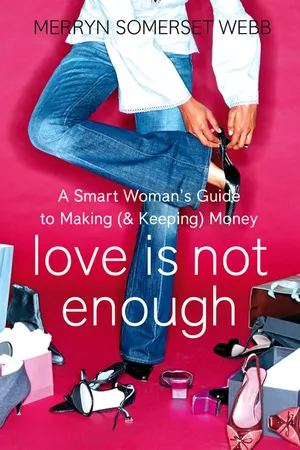
This is a test
- English
- ePUB (mobile friendly)
- Available on iOS & Android
eBook - ePub
Book details
Book preview
Table of contents
Citations
Frequently asked questions
At the moment all of our mobile-responsive ePub books are available to download via the app. Most of our PDFs are also available to download and we're working on making the final remaining ones downloadable now. Learn more here.
Both plans give you full access to the library and all of Perlego’s features. The only differences are the price and subscription period: With the annual plan you’ll save around 30% compared to 12 months on the monthly plan.
We are an online textbook subscription service, where you can get access to an entire online library for less than the price of a single book per month. With over 1 million books across 1000+ topics, we’ve got you covered! Learn more here.
Look out for the read-aloud symbol on your next book to see if you can listen to it. The read-aloud tool reads text aloud for you, highlighting the text as it is being read. You can pause it, speed it up and slow it down. Learn more here.
Yes, you can access Love Is Not Enough by Merryn Somerset Webb in PDF and/or ePUB format, as well as other popular books in Desarrollo personal & Finanzas personales. We have over one million books available in our catalogue for you to explore.
Information
Topic
Desarrollo personalSubtopic
Finanzas personalesSection 1:
Finding the Money
“Make your money and buy your freedom.”
Tamara Mellon, owner of Jimmy Choo
1
Maximizing Your Income
How to Get Paid What You Are Worth
A few years ago Linda Babcock, a professor at Carnegie Mellon University in the US, noticed that year after year the starting salaries of the men who graduated from her classes were higher than those of the women – to the tune of around 7%. This confused her – they all left with similar qualifications and went into similar jobs. So she investigated. It turned out that the majority of the women, thrilled to be offered jobs, had accepted the starting salaries they had been offered. The men had not. They had negotiated the salary up – by an average of 7%. The employers were not discriminating against the women; the women were discriminating against themselves.
My mother always told me life wasn’t going to be fair. But for much of my childhood I wasn’t really convinced. It seemed to me that most of the time you got what you deserved. At school if you were nice to people they were generally nice back. If you worked hard you did well in exams and were praised accordingly. And if you didn’t you weren’t. It was the same at university: if you followed the rules and worked hard you got a good degree. If you didn’t you didn’t. Simple and perfectly fair.
Then I entered the world of work and found that my mother was completely right. In the office things aren’t fair at all: working hard and being nice in no way guarantees you a fair wage. Instead, if you are a woman, it very often condemns you to an unfair one.
According to the Women and Work Commission, women who work full-time are paid on average 13% less than men who work full-time and women who work part-time are paid a horrible 40% less than men. This gap has not closed significantly for going on 30 years and has barely budged in the last 10: in 1997 New Labour came to power full of heart-warming promises about their female-friendly policies but since then the pay gap between men and women for full-time work has fallen by only 3.6% and for part-time work by a mere 2.5%. If it keeps moving at this snaillike speed, says the Commission, it will be 140 years before male and female part-time workers earn the same wage for similar work.
The difference this makes is important. The average full-time salary for a man is around £31,000. The average for a woman is more like £23,000. Look at something like the banking sector and the difference is even more extreme: the average salary of a woman is £31,600 a year and that of a man £53,700. And even female company directors are paid less than their male counterparts: a survey from the Institute of Directors in 2005 showed that the pay gap here, in an area where one would think women would be tough enough to get what they wanted, was still 24%.
So what’s going on? There are all sorts of explanations doing the rounds. The main one is the fact that women tend to leave the workforce for long periods of time to have and to bring up babies, something that stops them moving into senior positions as often and as fast as men. It is also true that women tend to go into traditionally low-paid jobs such as those in childcare, in cleaning and behind cash registers (the three ‘c’s) and where the hours are more flexible than elsewhere. But there is more to it than just this. According to the Equal Opportunities Commission (EOC) 40% of the pay gap between the genders comes down to pure discrimination: women are paid less because they are women. For proof look no further than the fact that even before the baby thing kicks in women are paid less than men: research by the EOC tells us that five years after graduation the difference between the wages of equally educated men and women is, on average, 15%.
This depressing statistic is backed up by a study done by the London School of Economics (LSE) in 2003. The LSE tracked down 10,000 recent graduates and found that after three years of working (and before having children) the female graduates were earning 12% less than the male graduates. And according to the DTI, overall, single childless women make only 93% of what single childless men make.
Do you need a degree?
Education in itself is no guarantee of a high income. Consider the case of the average university degree. Today around 40% of young people go into some form of higher education. This means that having a degree isn’t special any more – everyone who wants one is now getting one so you aren’t going to get paid much of a premium for having one too. In fact, according to the Higher Education Statistics Agency, a good 25% of graduates now go into jobs that didn’t require them to have degrees in the first place: more are working in low-paid office administration jobs and customer service jobs (27%) than in ‘professional occupations’ (25%). Recent research also shows that the average graduate (male or female) now has to wait until they are 33 – that’s after 12 years of full-time work – for their earnings to overtake those of someone who skipped university and began work at 18. I’m not sure this should particularly surprise us. After all, most of us learn little of vocational use at university and the traits that employers value most are rarely teachable. When the Council for Industry and Higher Education last year asked 45 top businesses what they were looking for in employees the most common answers were ‘innovation’ and ‘the ability to think creatively’.
I once interviewed a charming young man with a good degree from a top university for a writing job at Moneyweek, the magazine I edit. A lot of what we do at the magazine is précising material from other publications so I asked him to précis a piece for me in order to check both his comprehension and his writing style. When I got his effort back I found it quite confusing: his article seemed to tell only half the story and came to no real conclusion. I dug out the original to check what had gone wrong. It soon became clear. The article I had given him to summarize was on two sides of one piece of paper. He hadn’t turned the piece of paper over. University not only didn’t teach him to think creatively. It didn’t teach him to think at all. In contrast, a year or two later I hired as my deputy editor a young woman who had not been to university. She was several years younger than most people I would have considered for the position (having three years more experience than most people her age) but I could see no difference between her skills and those of the many others (all graduates) who I interviewed for the job.
Given all this, it’s worth thinking very seriously about whether university is really for you, particularly with tuition fees now coming in at £3,000 a year and most students leaving university with upwards of £15,000 worth of debt (you don’t pay the fees until you graduate). If you can go to a top university and get a top degree odds are it will turn out to have been worth the effort, but if you are going to a low-grade university and expecting to get a third is it really worth the bother?

If you decide the answer is yes one of your main priorities (only just behind making sure you get at least a 2:1) is to get through the whole thing with as high an income as possible in order to run up as little debt as possible. Students from particularly needy families (annual income £17,500 or less) can get grants worth up to £2,700 a year in 2006–7, while everyone is entitled to cheap student loans of up to £4,405. These are far and away the best way to borrow, given that the rate is well below that on any other kind of debt and you don’t have to start paying the money back until your income hits £15,000 (see www.slc.co.uk for details of student loans). Otherwise there are hundreds of different grants, bursaries and scholarships about. A full listing of all the bursaries and scholarships on offer can be found at www.ucas.com, the website for the Universities and Colleges Admission Service. Note that a survey last year showed that 95% of students about to head for university knew nothing of the money on offer. This is excellent news for those who bother to find out: the fewer people who know the less competition there will be for the funds and the more there will be for those who have done some research.
Finally, you might need to think about working while you are at university. However this does need to be kept to a minimum. If you think you are working too much to study enough to get your 2:1 stop working: you don’t want to end your three years with nothing to show for it other than a skilled pint-pulling technique.
This sounds outrageous and it is. But the really nasty thing about it is that to a large degree it is our fault. Study after study shows that women are paid less not because their bosses are actively discriminating against them, but because they never ask for more. In 2006 Grazia magazine surveyed 5,000 working men and women, asking them about their pay and their thoughts on their pay. Two-thirds of the women who took part said that they had never asked for more money, despite the fact that 80% of them also said that they thought they were underpaid and to a degree overworked (50% of the men surveyed said they took a full lunch hour every day whereas 25% of the women said that they never took a lunch break at all and 61% said they never took full lunch breaks). Only 29% of the women surveyed said they had ever plucked up the courage to ask for a rise and of those, said Grazia, half claimed it was one of the most ‘stressful and embarrassing things’ they’d ever done.

Linda Babcock and Sara Laschever, the US authors of Women Don’t Ask, point to research showing that men initiate negotiations four times as often as women and that, unlike the women surveyed, who said negotiating was like ‘going to the dentist’, the men said they found it to be like a ‘wrestling match’. Men find negotiating exhilarating. Women find it humiliating. So much so that when they do force themselves into asking for a rise, say Babcock and Laschever, they do it so badly they end up with 30% less than men in the same circumstances.
So why do we find asking for money so hard? It seems to come down to a different method of self-measurement. Women assume that if they were worth more than they are paid, their boss would pay them more automatically, so they don’t ask. To do so would be embarrassing; it would be to suggest that work and the relationships formed at work are not satisfying in themselves but that they have a set monetary value. We also think it might somehow be rude and adversely affect our relationship with our boss – it’s an emotional thing for us. We think that pay levels should automatically be fair (just like A-level grades) and if they aren’t we are too nice to demand that they should be made so.
I’m guilty of this myself. Like many other women, I think a part of me feels I’m somehow lucky to have my job (rather than that my employers are lucky to have me) and that if I ask for more money anyone employing me would be entirely justified in telling me that I can empty my desk and be off – they can find someone else who would be thrilled to have my job on any salary with no trouble.
Men are different. They internalize their confidence more. They don’t need to be loved by their colleagues or their bosses and in general they don’t feel lucky to be allowed to work. Most of them are clear about the fact that they work mainly for money (and the status that brings) so they take a view on what they are worth and insist on having it. They can separate their view of themselves as a person from their idea of how they do their job and what they deserve as a result. Women think about their weaknesses when they negotiate. Men think about their abilities. Women self-deprecate. Men demand and then revel in praise and the status it brings. They ask more so they get more.
“Remember Ginger Rogers did everything Fred Astaire did, only backwards and in high heels.”
Ann Richards, governor of Texas 1991–1995
Those in any doubt that those people who ask for more get more should take note of a survey out from Woolworth’s just before Christmas the year before last. It pointed out that on average parents spend just under £100 more on Christmas presents for their sons than for their daughters. Why? The answers from the parents surveyed should give every woman in the country something to think about: boys ask for more presents, and the presents they ask for tend to be more expensive (the most expensive toy in the top five for girls that Christmas was the Amazing Amanda doll at £69.99, for boys it was the PlayStation Portable at £179.99). Girls also asked for smaller presents that they can ‘love, care for and collect’ said the Woolworth’s spokesman. They ‘keep their toys for longer and are not so demanding for the latest craze’. Boys, on the other hand, ‘always ask for the new toys as soon as they are released’.

And, just to ram the point home, the parents surveyed said that if they didn’t get what they wanted their boys got nastier than their girls.
The point is that self-discrimination starts young. Women don’t ask for enough often enough. The result? They get stuck with cheap dolls when they are 9 and then rubbish salaries when they are 29.
This kind of thing matters. Imagine that a man and a woman are both offered a job at the same time at the same place. The offer includes a starting salary of £25,000. The woman takes it. The man negotiates it up to £28,000. Thereafter they both get 5% pay rises every year over the next 30 years or so. How much more do you think he will earn over his career than she does?
The answer is a shocking £285,000. And that’s a minimum number: if the woman accepts the 5% every year but the man pushes it up a little more at each annual review (don’t forget men initiate negotiations four times more often than women) he will end up with even more. A quarter of a million pounds is many times more than the average person’s net worth will ever be but women throw that kind of money away every day simply by being too embarrassed, too shy and, let’s face it, too foolish to ask to be paid what they are worth. So next time you think that you’re lucky to have your job remember that, if you aren’t paid the market rate, you aren’t nearly as lucky as the employer who has managed to get you to do the same work as the man at the next desk for less money.

All this means that you must have your wits about you in the workplace. There are many ways to make yourself better off – and we’ll be looking at many of them later in the book – but the simplest way to get richer in a hurry is to make sure you are getting paid what you are really worth. Once you’ve done that you can start working to turn that stream of income into long-term wealth. But...
Table of contents
- Cover
- Title Page
- Dedication
- Contents
- Introduction
- Section 1: Finding the Money
- Section 2: Using the Money
- Section 4: Beyond the Money
- 53 Money-Saving Tips
- The Final Checklist
- Useful Websites
- Index
- About the Author
- Copyright
- About the Publisher